One year on: New research reveals the nine lessons we’ve learned from lockdown
The past year has been tough on us all. We’ve all had to quickly adapt to remote working and social distancing, and many of us turned to Google to find advice and support during these unprecedented times.
New analysis of our search behaviour carried out by Bupa’s health and wellbeing experts have identified nine lessons employers can adopt as we ease out of lockdown. Our experts also share their advice on how to form positive work habits as we look towards the future.
Lesson 1: Taking regular breaks from your workload is important
With our homes becoming multifunctional spaces for both home and work it has been hard to switch off from the stresses in our working lives.
The last three months of 2020 (October, November and December) saw Google UK search volumes for ‘burnout’ increase by 45% compared to December 2019.
Burnout is a result of facing continued, high levels of stress and pressure. It can lead to us feeling fatigued, irritable and unmotivated. What’s more, if it’s been brought on through work it can leave us feeling negativity towards our careers.
Lauren Gordon, Behavioural Insights Adviser at Bupa UK says, If you’re worried about burnout, it’s important to address the source. If it’s being brought on by work, speak to your manager to explain how you’re feeling and see what can be done to alleviate the pressure.
To help reduce the effects of burnout, I’d also suggest taking regular breaks. Even a five-minute break away from your workspace during the day to practice mindfulness or some simple stretches, can boost your mood helping you to tackle the day ahead.
Also, spreading your annual leave across the year allows you to switch off for longer periods of time. Be sure to avoid checking your emails whilst you’re away ‘ this can leave you feeling reenergised when you return to work, helping to reduce the risk of burnout.
Lesson 2: Our work needs to be challenging to keep us engaged
Boreout ‘ a mental health condition ‘ has surged in recent months, and during the peak of the pandemic last year, searches on Google for ‘boreout’ increased by 680%. At this time the Government revealed 46% of the UK workforce were working from home, with one third of employees working reduced hours, too.
Pablo Vandenabeele, Clinical Director for Mental Health at Bupa UK Insurance points out, with boreout, you’ll often feel as though your work isn’t challenging enough, or it’s too repetitive. Similar to burnout, you’ll experience anxiety and fatigue.
If you’re experiencing boreout it’s important to open-up to someone you trust about how you’re feeling. For example, talking to your manager about how you’re feeling and discussing any new responsibilities you could take on, will help you to focus on new challenges, overcoming boreout and supporting your career development.
Lesson 3: Greater flexibility leads to a happier workforce
Over the past year flexibility in the workplace has been more important than ever before ‘ especially for those juggling home schooling and work commitments.
At the beginning of the first lockdown in March 2020, Google UK searches for ‘working from home with kids’ peaked at a monthly search volume of 12,100 compared to a monthly search volume of 30 during March 2019.
There has been a shift in employers recognising the importance of striking a greater work-life balance too, with 67% of the UK workforce agreeing their employers have been supportive.
Although schools have reopened and restrictions are beginning to ease, its important a level of flexibility in the workplace remains, as we’re still navigating our way through a difficult time.
Lesson 4: Fast, quick, and healthy lunches help us tackle the afternoon ahead
We’ve spent more time at home than ever before over the past year, which has unfortunately made it easier to form unhealthy eating habits, like snacking and missing regular mealtimes.
Throughout 2020, searches for ‘healthy lunch ideas’ were consistently high ‘ peaking at 74,000 in May 2020.
Victoria Evans, Wellbeing Programme Consultant at Bupa UK and Registered Associate Nutritionist says there are simple steps you can take to tackle unhealthy eating habits: Avoid snacking on foods containing free sugars like biscuits, chocolates and fizzy drinks. Swapping these foods for healthier alternatives like fruit, veg sticks and nuts will help you to boost your energy levels and tackle the day ahead.
When preparing your lunch, aim to eat a meal with a balance of fruit and vegetables, protein (eggs, fish meat or dairy alternatives), carbohydrates (pasta, potatoes, rice and quinoa) and some healthy fats (olive oil and avocado).
This lunchtime, why not opt for a homemade soup, chilli, or quinoa salad? All of these tasty dishes should boost your energy levels and fight the post lunch lull.
Lesson 5: Too many video calls have left us feeling exhausted
During 2020, we saw fluctuating search volumes for a new search term ‘ ‘zoom fatigue’ with searches peaking at 4,400.
But what exactly is this new phenomenon? Zoom fatigue describes the anxiety and tiredness associated with using virtual platforms such as Teams, Zoom and Skype as a form of communication ‘ something many of us will have experienced over the last year.
When communicating through a screen lens our brains must work harder to make up for any lost communication signals such as body language. For others there is the worry of being interrupted by distracting noises, family members or technical issues. All these factors can contribute to feelings of video-call fatigue.
Lauren Gordon, Behavioural Change Adviser at Bupa UK, suggests turning your camera off when others are presenting and avoid multitasking during a call:
This can help reduce your cognitive load and focus at the task at hand ‘ reducing the effects of zoom fatigue.
Also, make sure that you’re still seeing people face-to-face wherever possible. Now that restrictions are lifting, for example, consider meeting friends outdoors.
Lesson 6: Your body will thank you for the right WFH setup
In March last year, we had to quickly adjust to working from home overnight, with only one in three of us having a dedicated workspace.
Research by Bupa found that, during 2020, 63% of the UK workforce have suffered injuries to their back, neck, hips, knees and wrists whilst working remotely.
Poor workspace setup can wreak havoc on your posture, causing aches, pains, and injuries. If you’re still working from home, try working from a desk or a kitchen table if you have no dedicated workspace.
Many of us often spend too long sat at our desks, this can lead to stiffness and muscle pain. Taking a break from your desk for a few minutes every hour to stretch your back, legs and rest your eyes is a great way to reduce your risk of injury.
Lesson 7: Be creative with your WFH events
Organising time for your team to socialise has positive benefits on employee wellbeing – such as boosting motivation levels and productivity – as well as promoting company culture and building a connected team.
In the run up to the festive season in 2020, online searches for ‘virtual team building activities’ in November 2020 increased significantly by 99%, peaking at a monthly search volume of 4,400.
Over the past year we have relied heavily on technology to keep in touch ‘ this has allowed us to think of new and creative ways to socialise. Virtual events can be as small or as big as you like ‘ for example this could be a weekly coffee catch up, workshop, or webinar.
Before planning your virtual event it’s important to consider the different personalities of your team.
Some team members may prefer to stay off camera or worry about technical glitches. Addressing these worries before your event will help put any worries at ease, helping your event with a great start.
To reduce video-call fatigue, consider factoring in time to your event to allow people to take time away from their screens before joining.
Lesson 8: Career development is a great way to feel a sense of control during uncertain times
Encouraging your team to develop their skills not only helps to boost their confidence but also builds an engaged and motivated workforce.
Last year searches for ‘online learning’ increased by 400% – and with Google searches for ‘boreout’ also increasing during 2020, career development has given many of us something positive to focus on and help to reduce the risk of anxiety and fatigue.
Clinical Director for Mental Health at Bupa UK Insurance – Pablo Vandenabeele says, developing a skillset that will help with progressing your career doesn’t need to be directly linked to your current role. Learning a new langue, craft or hobby all count towards furthering your skills.
As an employer you can support your employees to further their skills by sharing any opportunities that would be beneficial to your team. As well as hosting workshops, webinars and lunch and learn sessions ‘ there are lots of ways you can motivate your team to develop their skillset.
However, it is important to remember further learning should be optional rather than compulsory. Some members of your team may feel as though their time is stretched more than ever right now, especially as we navigate our way through ‘the new normal’.
Lesson 9: A morning routine sets your day off with a great start
Finding a morning routine that works for you can boost your mood and productivity levels for the day ahead. With the days becoming longer and mornings brighter now is the perfect time to give this some thought.
With so much change over the past year, many of us have found it difficult to follow a structured routine to our day. If you feel as though you have made a habit of snoozing alarms and rushing to log on to your laptop to start your working day in the morning ‘ you’re not alone.
In fact, many of us turned to Google for our inspiration last year, with queries about ‘morning routine ideas’ increasing by 56% in May last year.
Behavioural Change Adviser at Bupa UK, Lauren Gordon shares her simple way to create a morning routine.
You can form a routine by structuring behaviours you would usually do, for example making your bed, having a shower and getting dressed. However, you could also try to adopt new behaviours such as swapping your morning commute time for mindfulness practice, a morning workout or walk.
There is no one way to create a morning routine ‘ it’s important to find what works for you. However, following a structure routine each morning can be helpful in reducing stress and improving your sleep and time management.
“
Share via:

Pablo Vandenabelle








































